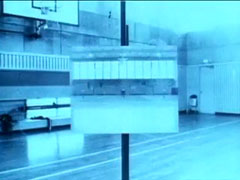
Spacy, 1981,
Experimental Film by Takashi Ito
This totally compelling experimental film Spacy, 1981 was introduced to me by a university classmate (thanks Sam). For further info on Ito, see filmography here and continue reading here:
The Ecstasy of Auto-machines
by Norio Nishiiima
Takashi Ito, Born in 1956 in Fukuoka, Japan.
Ito is one of the leading experimental filmmakers in Japan. He
graduated from Art and Technology Department of Kyushu Institute of Design in
1983 during which he made a debut with the film SPACY in 1981 (Inagaki who
created sound effects for the film was also a filmmaker and his classmate at
the institute). He was rather a premature virtuoso.
SPACY is consisted of 700 continuous still photographs which
are re-photographed frame by frame according to a strict rule where movements
go from rectilinear motion to circular and parabola motion, then from
horizontal to vertical.
The technique itself of reconstructing sequential photographs
was already seen in the earlier Japanese experimental films during the 70s such
as ĀTMAN (1975) by Toshio Matsumoto (he was Ito's teacher at Kyushu Institute
of Design) and DUTCH PHOTOS (Orandajin no Shashin,1976) by Isao Kota whose
influence is apparent in Ito's works. However, one finds Ito's style more
complex and sophisticated, and utterly new.
For example, in ĀTMAN the subject is a human being
disguised with Japanese Noh-mask whereas in SPACY the subject is photograph
itself. This, together with the last shot where the camera and the filmmaker
(self-portrait) come into the same frame indicates the self-reflexive
characteristic of his work. Compared to the two-dimensional
"flip-book" style illusion of DUTCH PHOTOS, SPACY has vast
spaciousness and dramatic sensation of movement and when it's accompanied by
the sound, the film reveals the side of a fantastic film.
"Film is capable of presenting unrealistic world
as a vivid reality and creating a strange space peculiar to the media. My major
intention is to change the ordinary every day life scenes and draw the audience
(myself) into a vortex of supernatural illusion by exercising the magic of
films." (Takashi Ito, in Image Forum, Oct.1984)
We were also enchanted with the fast speed of
"automatic" camera as if it was computerized. The ecstasy of
auto-machines which move beyond man's logic and sensation. And the filmmaker's
desire to "get into" the film instead of possessing it. This ecstasy
and the desire are common to all of his films including sequential photograph
works as well as his other series such as THUNDER (1982) GHOST (1984) and, GRIM
(1985) which are occult experimental "horror" films featuring the
technique of bulb shutters and time-lapse photography. In his most recent works
THE MOON (1994) and ZONE ( 1995), two styles are integrated under the motif of
"dreams and memories".
